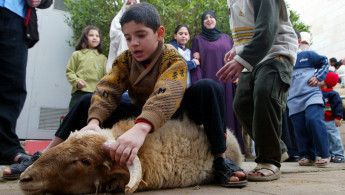Iraqi Sunni and Shiite Muslims are divided over when to celebrate Eid Al-Adha
Shias and Sunnis in Iraq are not on the same page as per identifying the dates of the Muslim's two holy feasts in the year, Eid al-Fitr and Eid al-Adha.
The Diwan of Sunni Endowments has identified 30 June as the first day of Zul Hijjah month and 9 June as the first day of Eid al-Adha, Iraqi state media reported. Meanwhile, the office of Grand Ayatollah Ali Al-Sistani, the top religious authority for Iraq's Shia Muslims identified 10 June as the first day of Eid.
As per the teachings of the Prophet of Islam, Muhammad, sighting through the naked eye of the new crescent moon marks the start of a new month and the end of the previous one.
Identifying when Eid al-Fitr and Eid al-Adha occur is based on the sighting, through the human eye, of the new crescent Moon. But the difference in these sightings between the Sunnis and the Shias in Iraq is far beyond an astronomical considerations and is often related to a difference in political views.
"I think the current difference on the start date of the feasts is totally politically based, and it is for the purpose of showing religious powers. Throughout Islamic history, the Sunnis were most times in power, thus the Shias had kept their own religious power within the religious institutions that had different views from the Sunnis in order to portray their own influence," Abdullah Reshawi, a Kurdish writer on religious topics, told The New Arab.
"The criticism is that the Shias sighting of the new crescent Moon is always a day after that of the Sunnis, this is illogical and confirms that the difference is political," he added.
The Kurdish scholar also asserted that this difference is "dangerous" and unifying the dates of these feasts, not only among the Shias and the Sunnis but among all the Muslims in the world, needs a lot of effort.
"The feasts in Islam are supposed to be symbols for unity. If these symbols lead to division, this is a mistake and part of the backwardness that Muslims are suffering for centuries," Reshawi added.
A Shia scholar in Sulaimaniyah told TNA on condition of anonymity that seeing the new crescent Moon does not require adherence to the views of the Shia religious doctrine.
Eid Al Adha, or the "Feast of Sacrifice," is celebrated by Muslims worldwide after two months and 10 days from Eid al-Fitr. Eid Al Adha is marked by communal prayers, visiting neighbours and relatives and, for many, slaughtering livestock and giving the meat to the poor. The origin of Eid stems from the story of when Prophet Abraham saw in his dream that God ordered him to slaughter his son, Ismail.
The story is mentioned in the Quran, the holy book of the Muslims.
When Abraham was about to sacrifice his son, the Angel Gabriel was sent by God with a huge ram to sacrifice the ram instead.




 Follow the Middle East's top stories in English at The New Arab on Google News
Follow the Middle East's top stories in English at The New Arab on Google News


